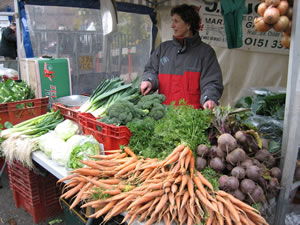Local, organic, processed or imported?
| Local or Imported? The most local foods will have travelled the smallest distance, and result in lower emissions. However, in the real world there is often not such a clear-cut answer.
A DEFRA study in 2005 showed that strawberries imported from Spain can actually result in less carbon dioxide than ones grown in heated greenhouses in the UK. To provide strawberries for as much of the year as possible, farmers in the UK may grow strawberries in greenhouses that are artificially heated using gas. This causes more carbon dioxide emissions than transporting them from Spain where additional heating is not necessary. However, to complicate matters still further, some growers of strawberries and tomatoes are now teaming up with industry to make use of waste heat, steam and carbon dioxide to grow out of season produce in the UK. Organic Foods? Organic production avoids use of chemicals that require energy to produce and transport, so should therefore generate less carbon dioxide. Processed or Fresh? Processed foods require energy for processing, and this will generally result in carbon dioxide emissions. Additives may also be used, with accompanying carbon-emissions. However, cooking food usually also requires energy. There is never a straightforward answer.
The Best ChoiceLocal, organic and in-season food generally results in lower carbon dioxide emissions. For strawberries, the best would be local, pick your own strawberries. Remembering of course that you can’t take the car to the farm! |

